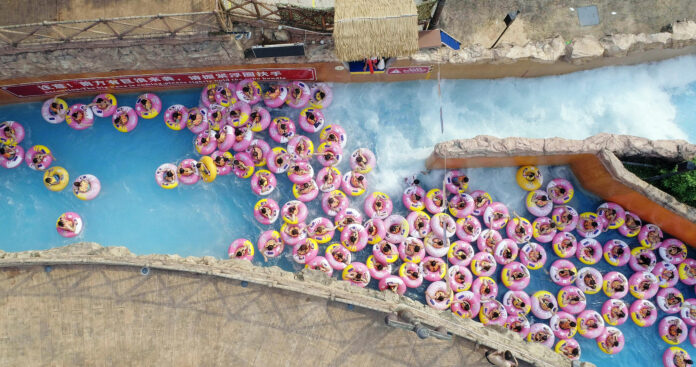“Those sex dolls are artisanal,” Jessica Kingdon says of the toys that appear in her new documentary, Ascension, which made its local premiere during SFFILM’s Doc Stories ahead of its wider Fri/12 opening at the Roxie’s Virtual Cinema.
Scenes in a sex doll factory are among the most striking in Kingdon’s film, which explores the economic layers of the Chinese Dream, examining labor, consumerism, and class in a Communist country that is, paradoxically, also hyper-capitalistic. (Read Dennis Harvey’s review of Ascension here.)
There is no narrative, only imagery as Kingdon’s camera observes laborers at the bottom rungs of society trying to simply find work to sustain themselves and their families, people attempting to move socially and economically upward by defining their personal brands to become social media influencers, and the excesses of the wealthy.
There are also scenes of people simply at work, including the ladies in the sex doll factory, diligent in their efforts to create a quality product. “Those are good jobs,” Kingdon says. “They have AI components in them. They are very creepy, but they can cost $10,000. Those dolls aren’t for a mass-market audience. You have to have a lot of money. It’s very specialized labor.”
Kingdon’s grandparents fled China in 1949 when the Communists came into power. Nearly 70 years later, she returned to her ancestors’ country to make a short, Commodity City, drawn by how a nominally Communist society had become a locus of globalism and capitalism. The focus then was on Yiwu International Trade City, the world’s largest wholesale market for the cheap consumer goods that flood the world.
That experience spurred her to further exploration. Originally, she sought to make a trilogy of shorts that would be more environmentally driven, focusing on production, consumption, and waste. But then someone she was pitching to wondered why she wasn’t planning a feature.
“It is actually what I wanted to do all along, but I just never thought that I could actually pull that off, since there aren’t that many films that take place in this vignette landscape,” Kingdon says. “But that kind of gave me the courage to go and just try to do it.”
There are 51 locations in Ascension, from mundane work places to a butler school and water parks. Surprisingly, gaining access to her locations was never an issue. “None of the places that we were filming in were overtly politically sensitive and people are curious so they were open to having new people come in and film, and a lot of these places are places where people are selling something,” says Kingdon.
One location Kingdon and her team did seek and could not access was a toxic lake, where waste from the mined metals that power our smartphones reside. That site was hidden, although she was able to capture shots of polluted water—with mixed results.
“I think it’s clear that you need to viscerally be there and smell the chemicals but, visually, it looks like the water, it’s kind of a little bit muddy,” says Ascension producer Kira Simon-Kennedy.
One thing Kingdon emphasizes is though her film takes place in China and is specific to the Chinese experience, its lens is, in fact, wider. That labor, those goods are in service of a global economy. And those at the very top enjoying their wealth are also part of a global community.
“It is about this interconnectedness,” Kingdon says. “And even though you might look at a plastic water bottle recycling factory and feel like it looks very foreign, it’s, in fact, very relevant to your life. We’re drinking from water bottles right now. So, it’s a lot of things that you would see and handle and interact with on a day-to-day basis, things that we’re intimately familiar with and dependent on.
“But the source that makes it possible is often invisible. I was trying to create space for a visceral experience of these sites related to the industrial supply chain.”
“We are always saying we could have made this film, depending on the decade, in so many different countries,” adds producer and cinematographer Nathan Truesdell. “It could have been in the UK in the 1800s or could have been the US in the 20th century.
“A lot of this manufacturing is getting moved out of China already. Now, it’s in many parts of Africa. Ascension is almost a snapshot in time where it’s currently happening in China. But because of the way global capitalism works, it’ll go somewhere else.”





